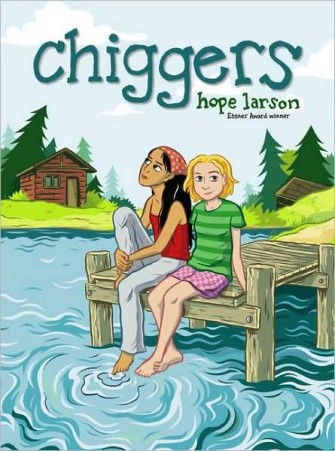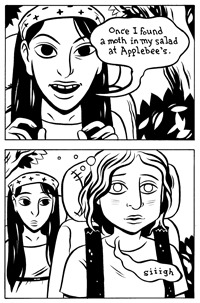 Home > CR Reviews
Home > CR Reviews Chiggers
posted April 25, 2008
Chiggers
posted April 25, 2008

 Creator:
Creator: Hope Larson
Publishing Information: Simon & Schuster, hardcover/softcover, 176 pages, June 2008, $17.99/$9.99
Ordering Numbers: 9781416935841 (ISBN13HC), 9781416935872 (ISBN13SC), 1416935843 (ISBN10HC), 1416935872 (ISBN10SC)
There's a lot to admire in Hope Larson's new book
Chiggers, and the most flattering light you can shine on it is one that compares to the recent spate of big-company graphic novels aimed at young teens. Unlike some of those books, nothing here feels high concept. None of the girls easily slips into a niche [at least not always]. Perhaps best of all, Larson trades in quieter moments rather than transformative ones and favors incremental changes instigated by friendships rather than some sort of artificial crucible that forces our protagonist to change on the spot. It may not provide as easy a path into an adaptation for television or film, but the quirkier road traveled by Larson will likely make this book the kind that a lot of readers will pick up, treasure for a time, and then never forget.
 Chiggers
Chiggers is set in a small summer camp in North Carolina, near Asheville. Abby is slightly young for her age and after a favored relationship with an older camper turned CIT (counselor-in-training) falls to the wayside because of demands on the older girl's time, she becomes torn between a pair of bunkmates and an odd newcomer. Abby also undergoes her first romance. The best work in the book concentrates on what may be observations made from the author's life. For instance, there's a scene where Abby and the strange girl Shasta choose to ignore each other out of a kind of nod to social reality or just simply to take a break; another moment that stands out is when Abby grows frustrated with Shasta's created persona and yells at her to admit that going in the water or not is her choice. The way that some of the girls cast Abby's boyfriend Teal as a hapless loser while Shasta and eventually Abby imbue his skill at Dungeons and Dragons with a kind of worshipful awe you can only apply to things you don't understand that people you like pursue -- it's delicately played.
Chiggers' best moments don't just feel well observed, they feel arbitrary and slightly odd, and therefore more true to life than the kind of peak experience and TV show catharsis you might see in some of the other books out there. Larson also does some deft work in suggesting how in negotiating friendships with her cabin mates, and whatever it is she has with her new boyfriend, Abby grows up a bit like most adolescents do: by creating a persona that works in peer to peer relationships. While the computer lettering doesn't always appeal [EDITED TO NOTE: The computer lettering was a temporary measure, replaced in the published edition, and as you can see from the art is quite lovely], Larson has an evocative line and reinforces a lot of her panel with visual flourishes such as names that float around Teal or vines/snakes that come out of other campers mouths. I might have read this book one hundred times between the ages of ten and eleven.
While I think it could a dear book for people that way, I'm not sure that it's a classic or that it would communicate effectively to a broad audience outside of a certain range of people with at least one foot in the world of When the Hand Goes Up, Little Bunny Foo Foo and Going on a Bear Hunt. Larson doesn't bring the same kind of sharp, observed reality to the world in which the characters live as she does to the interpersonal relationships; at the same time some readers will recognize elements of their own camp experiences there's a touch of the inauthentic in that the world seems to fall away entirely and become dominated by Abby's thoughts and relationships; the camp doesn't intrude on the emotional through-line unless Larson wants it to. There's also a bit of a what I call a decency fantasy element to what goes on; the characters themselves are quirky but sometimes they settle into established roles in a manner that fails to convince.
After reading
Chiggers, I renewed my own membership to my summer camp's alumni group, so I know that I liked it on some level. Several levels. On balance I think it's a work that will sneak up on some people; if it doesn't then assault them, but chooses to stay on the sidelines nearby, well, not every week of summer camp was a once in a lifetime experience, either.



